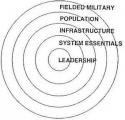
Originally Posted by
Global Scout

Webster's definition, War:
1a: a state of usu. open and declared armed hostile conflict between states or nations.
2a: a state of hostility, conflict, or antagonism b: a struggle or competition between opposing forces or for a particular end
Warfare: 1. Military operations between enemies. 2: Struggle between competing enities.
Interesting enough I couldn't find a definition for war or warfare in the DoD Dictionary? I guess it is one of those words that is assumed to be common knowledge, yet that obviously isn't the case.
We had the Cold War, the War on Drugs, the War on Terrorism, the Long War, the Civil War, etc., and many of these don't necessarily fit the state versus state model.
Operation Iraqi Freedom was definitely a war by the classical definition, but did the war end in phase III? If it did, what is it now?
Steve you have made numerous brilliant points throughout, and I think you are on to something here, but your leaving us hanging. If it is war, then what type of conflict is it? If the military is charge is it war, and if the State Department is in charge it is something else? There are at least categories of conflict, state versus state, state versus a non-state actor, and non-state actor versus non-state actor. All them can involve aspects of what some call total war where we target each other with kinetic strikes, information, diplomacy, economic actions, and the list goes on and on. It is basically any action or combination of actions used to persuade the competitor to behave acceptably (or destroy him completely). When is it normaly statecraft and when is it war?
Let's say your right, and what we're doing in Iraq and Afghanistan and elsewhere to support the Long War is not war, what is it? If we give it another name, what advantage does that give us?









 ; what I think is that 'war' implies conflict or combat. When you're in one you know it but aren't concerned about the esoteric arguments of what 'it' is. One does not engage in (as opposed to provide aid or efforts in support of) COIN unless one is at war; COIN entails killing and dying at base or tactical level and political finesse at that and higher levels (not, BTW, one of the US' strong points...). A COIN campaign IS the operational level of war for the Nations involved, no more and no less. The strategy put us in the Nation wherein the campaign takes place, the operational level is the COIN effort and it and the Tactical level operations and all the TTP must be tailored to achieve the political ends of that particular National effort -- and each COIN campaign is different (thus we have to be careful not to draw too many 'lessons' from a specific campaign).
; what I think is that 'war' implies conflict or combat. When you're in one you know it but aren't concerned about the esoteric arguments of what 'it' is. One does not engage in (as opposed to provide aid or efforts in support of) COIN unless one is at war; COIN entails killing and dying at base or tactical level and political finesse at that and higher levels (not, BTW, one of the US' strong points...). A COIN campaign IS the operational level of war for the Nations involved, no more and no less. The strategy put us in the Nation wherein the campaign takes place, the operational level is the COIN effort and it and the Tactical level operations and all the TTP must be tailored to achieve the political ends of that particular National effort -- and each COIN campaign is different (thus we have to be careful not to draw too many 'lessons' from a specific campaign). ).
).





Bookmarks